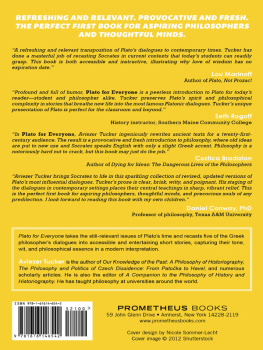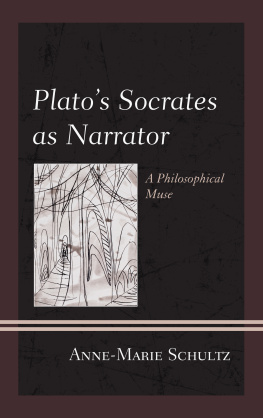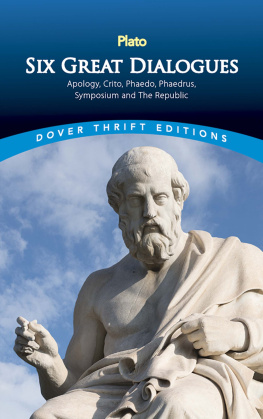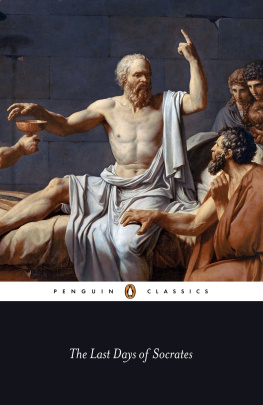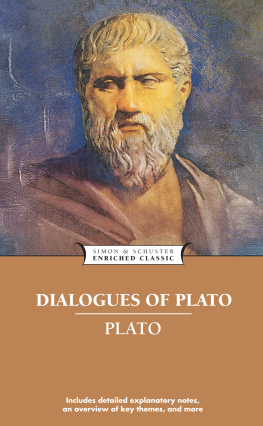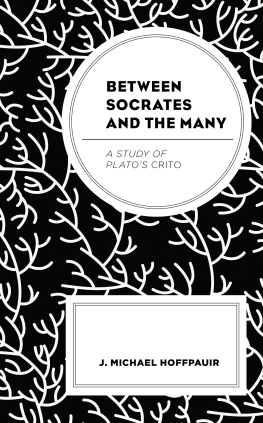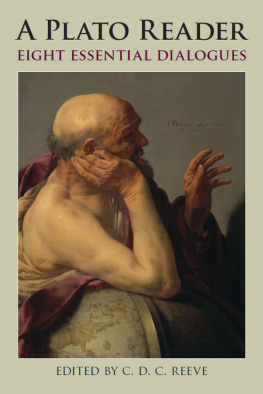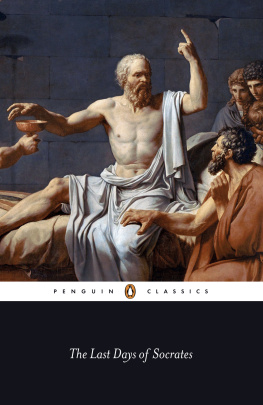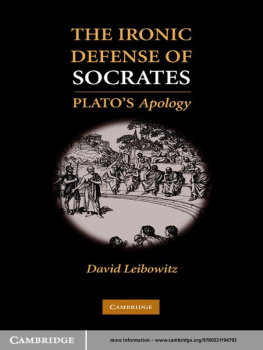
Copyright
Published 2013 by Prometheus Books
Plato for Everyone . Copyright 2013 by Aviezer Tucker . All rights reserved. No part of this publication may be reproduced, stored in a retrieval system, or transmitted in any form or by any means, digital, electronic, mechanical, photocopying, recording, or otherwise, or conveyed via the Internet or a website without prior written permission of the publisher, except in the case of brief quotations embodied in critical articles and reviews.
Trademarks: In an effort to acknowledge trademarked names of products mentioned in this work, we have placed or after the product name in the first instance of its use in each chapter. Subsequent mentions of the name within a given chapter appear without the symbol.
Cover image 2012 shutterstock
Cover design by Nicole Sommer-Lecht
Inquiries should be addressed to
Prometheus Books
59 John Glenn Drive
Amherst, New York 142282119
VOICE: 7166910133 FAX: 7166910137
WWW.PROMETHEUSBOOKS.COM
17 16 15 14 13 5 4 3 2 1
Library of Congress Cataloging-in-Publication Data
Tucker, Aviezer, 1965
[Works, Selections]
Plato for everyone / by Aviezer Tucker.
p. cm.
Includes bibliographical references.
ISBN 978-1-61614-654-2 (pbk. : alk. paper) ISBN 978-1-61614-655-9 (ebook)
1. Plato. I. Tucker, Aviezer, 1965 II Title.
B395.T83 2013
184dc23
2012040648
Printed in the United States of America on acid-free paper
Introduction
Introduction
Subversive! Provocative! Funny! Intellectually stimulating and challenging! Downright annoying! Socrates was anything but irrelevant or boring to the ancient Athenians. Indeed, the Socrates that emerges from Platos dialogues subversively challenged everything the ordinary Athenian citizen held sacred, within the civic consensus, beyond doubt: their religion and patriotism, the expertise of politicians and other professionals, the established social hierarchy, and their sense of propriety and morality. Whatever else Socratess contemporaries may have thought of himand they did execute him eventuallythey could not accuse him of being irrelevant.
Something not very pleasant happened to Platos Socratic dialogues on their way from the Athenian marketplace (the agora) to the twenty-first-century bookstore and classroom. The modern reader and student who does not possess excellent knowledge of classical Greece and its history, culture, religion, art, and literature often misses the subversive and humorous aspects of Platos dialogues that were obvious to their targeted original readers. Lost in translation, readers often miss much of what the ancient readers would have found poignantly relevant.
Contemporary productions of classical plays and operas frequently transpose the plot and scene to the present to demonstrate that the universal qualities of the classics are independent of any particular historical era or geographical origins. They demonstrate the contemporary relevance of plays and operas that were written for and about different eras. Shakespeares Richard the Third and Macbeth often portray contemporary dictatorships and tyrannies, highlighting the universal qualities of self-destructive lust for power that have been more manifest during the twentieth century than perhaps any other period in history. One production of Romeo and Juliet , about absolute, tragic love that transcends tribal rivalries and loyalties, was set in contemporary Los Angeles among members of rival street gangs. Its contemporary relevance could be (and perhaps has been) demonstrated whether it were set in Northern Ireland or the West Bank or Rwandaor any other area of tribal conflict. Beethovens opera Fidelio and Puccinis Tosca explore the universal themes of freedom and tyranny. No wonder they have been staged in various historical times and in places where artistic freedom and dissent had to confront political oppressionfrom a Nazi concentration camp to Maoist China. Mozarts Don Giovanni has been set in the South Bronx. I watched Verdis Macbeth in Berlin, where the production took place in the former East Germany, and Wagners Meistersinger in Cologne set in that city and concluding with the construction of the Cologne Opera House itself, opened by West Germanys chancellor, Konrad Adenauer. All these contemporary adaptations of stage classics bring home to the audience the contemporary relevance of their universal themes. They introduce contemporary analogies to past themes, characters, and plots, bringing them home, as it were.
Platos philosophical dialogues are also classical plays. They explore universal themes that can be manifested in different historical contexts and interpreted and reinterpreted as contemporary and relevant by each generation. I offer here such an interpretation of Plato for our time.
Having discussed Platos dialogues in English translation with students in several classes, I found that two aspects of the dialogues get in the way of fully appreciating and enjoying them. First, many students have never read a play before. They read novels and short stories, but the format of reading rather than performing or watching a play was unfamiliar. They found the style fragmentary and difficult to follow, and they preferred the natural flow of a story. Second, since the large majority of the students were not familiar with classical Greek civilization, they found many of the cultural and historical references in the dialogues puzzling and distracting. They missed the philosophical essence of the dialogues as they attempted to come to grips with the exotic cultural references. Platos dialogues are full of humor and repartees between Socrates and his interlocutors, but it is easy to miss them if the reader is not familiar with their cultural context. I explained the jokes in class, but jokes that need to be explained rarely end up being funny. These barriers have nothing to do with the philosophical questions, methods, and contents of the dialogues, which I consider their essential and important aspects. Most people read Platos dialogues to become familiar with the problems of philosophy, the Socratic method of dealing with them, and Platos proposed solutions. The classical cultural context is inessential and can even be distracting.
These academic experiences led me to the idea of rewriting some of Platos dialogues in the form of short stories and moving the scene and plot to the present United States. This kind of pedagogical strategy may offend purists who would rather adhere to teaching translations of the original, but let us not forget that Platos dialogues used to be taught exclusively in the original Greek. We started teaching Plato in translation only much later. Teaching a contemporary version of Platos dialogues rewritten as stories would be just one more step in the direction of making Plato more accessible to a wider public without compromising the philosophical essence of the dialogues, the drama, and the humor.
I attempt to refresh Platos arguments to make them as relevant today as they were two and a half millennia ago. Rather than challenge Athenian mores, civic virtues, and religion, which nobody holds today, I updated the dialogues to challenge and indeed to provoke todays readers by critically examining deeply held but rarely challenged social norms, religious beliefs, and political practices. I attempted to sharpen and retain the subversive cutting edge of Socratess and Platos philosophy, which has been blunted over the centuries by the passage of time. The value of the provocation should be, to paraphrase Kants comment regarding Hume, in waking up the readers from their dogmatic slumber to the challenges and possibilities of philosophy. Whatever other impressions readers may take from this book, they should not remain indifferent or disengaged. Socrates was provocative, and so is this book. I do not expect or even wish the reader to adopt or accept all or most of the arguments and opinions my Socrates presents here. Indeed, I do not agree with everything my Socrates says in this text. I do hope, however, that the reader will learn how to ask questions; how to doubt commonsense, everyday beliefs and assumptions; how to inquire critically; how to be actively curious; how to think like a philosopher; and, eventually, how to experience what is it like to be a philosopher.

